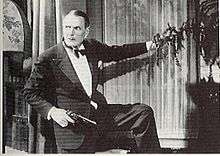Rynox
| Rynox | |
|---|---|
 Screenshot of Stewart Rome | |
| Directed by | Michael Powell |
| Produced by | Jerome Jackson |
| Written by |
Michael Powell Jerome Jackson Philip MacDonald |
| Starring |
Stewart Rome John Longden |
| Cinematography | Geoffrey Faithfull |
| Edited by | Arthur Seabourne |
| Distributed by | Film Engineering–Ideal |
Release dates |
|
Running time | 48 minutes |
| Country | United Kingdom |
| Language | English |
Rynox is a 1932 British crime film, directed by Michael Powell and starring Stewart Rome and John Longden. Rynox was adapted from a novel by popular thriller writer of the day Philip MacDonald.
For many years Rynox was believed to be among the lost films of Powell's 1931–1936 quota quickie period; however an original print was found in 1990 in the vaults of Pinewood Studios and was subsequently transferred and restored by the BFI National Archive.
Plot
Wealthy businessman F.X. Benedik (Rome), head of the Rynox company, claims to have been receiving threats from a mysterious stranger named Boswell Marsh. Benedik is subsequently found murdered and the hunt is on for the elusive Marsh.
Benedik's son Tony (Longden) takes over the running of the business and tries to find some lead on Marsh, and why he should have borne a murderous grudge against Benedik Senior. His investigations lead him to the unexpected finding that Marsh never existed.
After discovering that he was terminally ill, his father had committed suicide, having staged the elaborate deception about the non-existent Marsh in an attempt to cover the fact that he intended to take his own life.
Cast
- Stewart Rome as Boswell Marsh/F.X. Benedik
- John Longden as Tony Benedik
- Dorothy Boyd as Peter
- Charles Paton as Samuel Richworth
- Leslie Mitchell as Woolrich
- Edward Willard as Capt. James
- Fletcher Lightfoot as Prout
- Sybil Grove as Secretary
Reception
Although shot on a tight budget (Powell's own recollections varied between £4,500 and £8,000)[1] Rynox was exceptionally well received by contemporary critics. Writing in The Observer, noted critic C. A. Lejeune presciently remarked: "Powell's Rynox shows what a good movie brain can do... this is the sort of pressure under which a real talent is shot red-hot into the world." Documentary film pioneer John Grierson declared the film "as good as Hollywood" and that "there never was an English film so well-made". A 21st-century assessment by Sergio Angelini of the British Film Institute states: "Powell's direction already shows his characteristic energy and visual imagination, as well as his debt to the German Expressionist cinema of the 1920s. Rynox is full of quick cuts, tracking shots, unusual angles as well as montages, all of which help effectively to draw attention away from ...the film's small budget."[2]
See also
References
- ↑ Rynox + His Lordship powell-pressburger.org Retrieved 12-08-2010
- ↑ Rynox Angelini, Sergio. BFI Screen Online. Retrieved 12-08-2010
External links
- Rynox at the Internet Movie Database
- Rynox at AllMovie
- Rynox at BritMovie